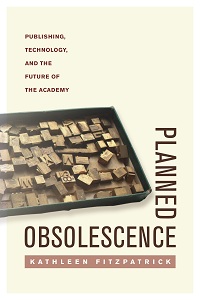Planned Obsolescence: Publishing, Technology and the Future of the Academy

Original 1st edition cover
|
|
| Author | Kathleen Fitzpatrick |
|---|---|
| Country | United States |
| Language | English |
| Publisher | NYU Press |
|
Publication date
|
2011 |
| Media type | Print (Paperback) |
| Pages | 245 |
| ISBN | |
Planned Obsolescence: Publishing, Technology, and the Future of the Academy is a book by Kathleen Fitzpatrick, Director of Scholarly Communication at the Modern Language Association and Visiting Research Professor of English at New York University, published by NYU Press on November 1, 2011. The book provides an overview of issues facing contemporary academic publishing, including the closing of academic presses and the increased pressure on faculty to publish to achieve tenure. Fitzpatrick's central argument is that academia should embrace the possibilities of digital publishing, which will in turn change the culture of academic writing and publishing.
The book is divided into five chapters, not including the introduction and conclusion: Peer Review, Authorship, Texts, Preservation, and The University.
Fitzpatrick starts the book by deconstructing one of the most important steps in the academic publication process - peer review. Drawing on a wide-ranging history of and problems in the process of academic peer review, she argues that much of the peer review process is about credentialing rather than about encouraging good ideas. Digital technologies allow for a review process that is more in-line with promoting good ideas: "putting them on the digital table, welcoming diverse attitudes toward them, selecting, shaping and reconfiguring them “curatorially” in imaginative response to freely offered and serious opinions". Keeping this in mind, Fitzpatrick offers a new model for peer review - 'peer-to-peer review'. She uses MediaCommons as an example of a community-filtered web platform that can function as a site to comment on a draft of scholarly work. On such an online platform, authors can post a draft manuscript and invite comments from their peers or the public, or both.Planned Obsolescence itself was posted on MediaCommons Press as a draft and comments were invited from the general public.
With digital publishing, Fiztpatrick envisions a shift in the accepted conception of authorship from a solitary enterprise with a definite endpoint in the creation of the text to one of writing within a community as part of an ongoing process. This change is a result of the capabilities of word processing, which allows for the swift and simple revision of text, and the digital networking, which enables linking, reader commentary, and version control. By releasing text to be read and commented upon online authorship becomes ongoing, process-oriented work taking place in a community of interested readers.
...
Wikipedia
